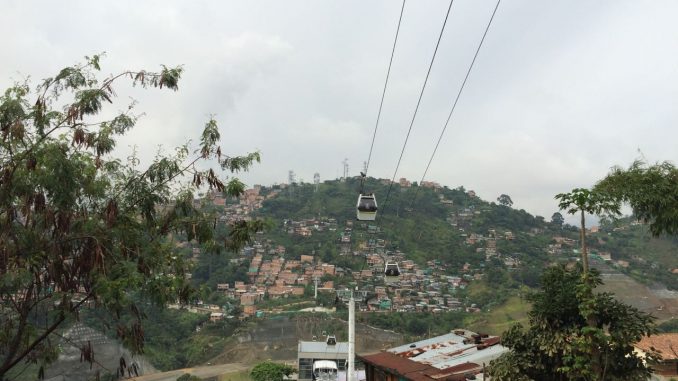
Medellin, Colombia boasts some new top-flight specialty coffee cafés
I was fortunate enough to visit Antioquia last week to attend the New Generation of Coffee Growers camp, and along the way I got to spend a little time visiting some new cafés in the region’s capital, Medellin.
Not too long ago, Medellin was one of the most dangerous cities in the world, but with some progressive projects, an innovative approach to development and a visionary leader, the city has seen a dramatic turnaround. Sergio Fajardo served as mayor of Medellin from 2003-2007. He is now the governor of the department of Antioquia and has pursued similar programs for the department that he initiated as mayor, including a huge emphasis on education, education that is free and open to everyone.

Part of his platform as mayor was the “most beautiful for the most poor” theory of development which spent government funds developing infrastructure for the previously ignored and dangerous slums of the city. Instead of spending money on project which would only help the richest members of the city, Medellin spent money building a unique transit system including the first metro rail in Colombia, giant escalators to carry people up the steep slopes of the city, and a series of aerial trams. They also built gorgeous new libraries and civic institutions in poorer parts of the city to encourage more connections between the different social groups and to make the poorest feel appreciated and part of the city’s fabric. It has been a smashing success.
Now instead of one of the most dangerous cities in the world, Medellin is considered one of South America’s best to live in. And instead of only finding cheap, “tinto” coffees made drinkable only through generous doses of sugar and milk hawked by the roadside, the people of Medellin, and visitors to the city, can find cafés and coffees on par with any great city in the world.

One of the most established of the new, specialty coffee scene cafés in Medellin is Pergamino. The flagship café is in the trendy Poblado neighborhood. Customers are welcomed into a bright, modern space with plenty of exposed wood, clean design and a great assortment of Colombian coffees brewed in a variety of styles.

“We’re seeing an awakening of people to the coffee they’re drinking,” Pedro Miguel Echavarria, who manages Pergamino and owns it along with his family. “Medellin has changed dramatically in the last 10 years. We went from the murder capital of the world to leading by innovation. The restaurant scene has exploded. That’s a signal of a kind of change you can’t deny. There’s still a lot of poverty, but you see a change. We saw an opportunity [to make a change] with coffee.” (Pergamino also has one of the best airport kiosks I’ve ever seen where you can get a freshly brewed cup and bag of coffee for your trip out of Medellin.)

Just across the street from Pergamino is Velvet, a café that’s been open for just over a year. Velvet is managed by Oscar S. Zuivaga, and owned by a Belgian pastry chef, who was drawn to Medellin for its innovation and is now in the process of exporting her café concept back to Brussels.

Oscar gestured toward the large video screen at the back of the ultra-modern café. “We watched [the livestream of] the WBC there,” he said. They were ecstatic when Australian Sasa Sestic won using a Colombian coffee.

Jose Zapata is a barista at Cariñito a newly opened specialty coffee cafe close to the new museum of modern art. He is gracious and excited about coffee. As he created a Chemex for me he said, “The coffee is story that I tell with love.” He trained in Bogotá before returning recently to Medellin. He is excited for the changes he has seen in the city and the growing interest in specialty coffee he helps cultivate in his customers. “We are a child in the specialty coffee world,” Jose said. “It’s a big world to know, but this is my passion.”

In the heart of downtown is an outpost of the Labratorio del Café, a delightful cafe that focuses on high-end deserts to pair with their specialty coffees. You can sit outside on the main city square, across from the Museum of Antioquia and the barista will create coffees for you table side.

It has a very European vibe, and on the gorgeous day I had there, the whole scene, coffee, and service made for an unforgettable experience. Here’s a great story on a visit to the cafe by a BBC reporter from earlier this year.

North of Medellin proper is Bello, a city that merges with the outer edge of Medellin. There you can find a true hole-in-the-wall café called La Cafeteca. It’s been open for about 9 months.

Bello tends to be more middle to working class than the neighborhoods where the other cafés are operating, but it still serves a bustling line of customers throughout the day. A husband and wife team, Andres and Sena, run Cafeteca, and Sena said, “People are used to cheap coffee, but when they taste this, they want specialty coffee.”

All in all, my café crawl though Medellin left me very impressed. The city of more than 2 million people is clearly still growing, as is it’s specialty coffee scene, but as more and more cafés open, and as Antioquia continues to invest in education (including coffee education for consumers) specialty coffee will no doubt continue its upward trajectory throughout the city and the department.

